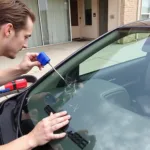Useful tools for fixing cars are essential for any car owner or mechanic. Whether you’re a DIY enthusiast tackling routine maintenance or a professional technician diagnosing complex issues, having the right tools can save you time, money, and frustration. This guide explores the essential tools for fixing cars, from basic hand tools to advanced diagnostic equipment.
Essential Hand Tools for Car Repair
Every car owner should have a basic set of hand tools for minor repairs and maintenance. These useful tools for fixing cars include:
- Screwdrivers: A set of Phillips and flathead screwdrivers in various sizes is crucial for removing screws and fasteners.
- Wrenches: Combination wrenches (with both open and closed ends) are versatile and essential for tightening or loosening nuts and bolts.
- Socket Set: A socket set with a ratchet handle provides leverage and efficiency for working with various bolt sizes.
- Pliers: Different types of pliers, such as slip-joint, needle-nose, and locking pliers, are helpful for gripping, cutting, and bending.
- Hammer: A ball-peen hammer is useful for tapping parts into place or removing stubborn components.
What tools do you need to fix a car if you’re dealing with a flat tire?
Tire Repair Tools: Handling Flats and Punctures
Dealing with a flat tire is a common car problem. Having the right car tire repair tools can get you back on the road quickly:
- Jack: A sturdy jack is essential for lifting the car safely to change a tire.
- Lug Wrench: This tool is specifically designed for removing and tightening lug nuts that secure the wheel.
- Spare Tire: Always ensure you have a properly inflated spare tire in your vehicle.
- Tire Pressure Gauge: Regularly checking tire pressure helps prevent flats and improves fuel efficiency.
- Tire Repair Kit: A tire repair kit can temporarily seal small punctures until you can get to a tire shop.
Beyond the basics, what are some good tools to have in your car for more advanced repairs?
Advanced Diagnostic and Repair Tools
For more complex car repairs and diagnostics, specialized useful tools for fixing cars are necessary.
- OBD-II Scanner: An OBD-II scanner reads diagnostic trouble codes (DTCs) from the car’s computer, helping identify the source of problems.
- Multimeter: A multimeter measures voltage, current, and resistance, aiding in electrical system diagnosis.
- Test Light: A test light helps determine if a circuit is live or grounded.
- Compression Tester: A compression tester measures the pressure in each cylinder, revealing potential engine issues.
- Vacuum Gauge: A vacuum gauge monitors engine vacuum, providing insights into engine performance.
“Having the right tools, like an OBD-II scanner, is like having a translator for your car. It helps you understand what’s going on under the hood,” says John Davis, a seasoned automotive technician. “It’s one of the most useful tools for fixing cars today.”
Conclusion: Equipping Yourself for Car Repairs
Having the right useful tools for fixing cars is empowering. Whether you’re performing basic maintenance or tackling more complex repairs, investing in quality tools will save you time, money, and headaches in the long run. Remember to keep good tools in your car for emergencies and regular maintenance.
“Even if you’re not a professional mechanic, having a basic set of tools and knowing how to use them can be incredibly valuable,” adds Maria Sanchez, a car enthusiast and DIY mechanic. “It gives you the confidence to handle minor issues and saves you from costly trips to the repair shop.”
Need help with a strange situation? Check out this article: dildo on tool box on graveyard cars.
Need assistance? Contact us via WhatsApp: +1(641)206-8880, Email: cardiagtechworkshop@gmail.com or visit our office at 910 Cedar Lane, Chicago, IL 60605, USA. Our customer support team is available 24/7.
